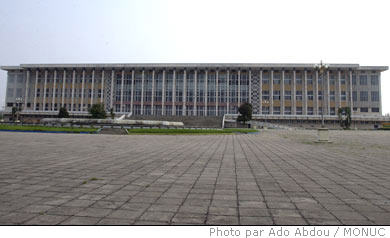On 11 January 2007, the DRC National Assembly adopted the decentralization law, which defines the functioning of the new DRC territorial entities, or provinces. Of the 348 deputies present, the law was adopted by a very large majority of 341. National Assembly president Vital Kamerhe said that “with the adoption of this text, the process of decentralisation becomes not only efficient, but also irreversible.” 
The law, which must now be examined by the senate, defines the organisation and the working of the territorial and administrative decentralised entities, and their respective villages, towns, districts and territories.
The law lays down the rules governing the reports of the territorial decentralised entities to the state and the provinces, and determines human and financial resources to be distributed to its entities.
Instead of the current eleven DRC provinces, the country will be divided into 26 provinces, including the city-province and capital Kinshasa, in accordance with the Congolese constitution, and this division should come into effect in the 36 months following the enactment of the law.
Under the new law, the provinces will keep 40% of the income that they generate, and adjustment is planned to maintain a balance between the poorer regions and the others.
Every decentralised territorial entity “has a separate budget, distinct of the budgets of the state and provinces,” and is allowed “to have exceptional resources,” but doesn't have the right to “resort to an outside loan.”
But the text of the new law states that “autonomous management does not translate into independence."
Under the new law, the state will be in charge of affairs such as foreign trade, the army, the currency, and the national budget, while the provinces will have the responsibility for provincial and local public functioning, as well as the development of mining and forest programmes, and will have part responsibility for roads.
Related articles
- • Felix Tshisekedi Sworn In as DR Congo President (January 24, 2019)
- • Felix Tshisekedi Elected DR Congo President (January 10, 2019)
- • Bemba, Katumbi renew their support for joint opposition presidential candidate Fayulu (November 16, 2018)
- • Vital Kamerhe also withdraws support for joint opposition presidential bid (November 12, 2018)
- • Oppositioin leaders pick Martin Fayulu as joint presidential candidate (November 11, 2018)
- • Jean-Pierre Bemba banned from running for president (August 25, 2018)
- • Vital Kamerhe named UNC presidential candidate (August 4, 2018)
- • No elections in DR Congo in December without electronic voting machines: INEC (February 13, 2018)
- • Kabila's Party Loses Seats in Parliament, Increasing Reliance on Allies (February 3, 2012)
- • Tshisekedi Says He Won, Can He Prove It? (December 17, 2011)
- • Supreme Court Rules Joseph Kabila Won Presidential Election (December 16, 2011)
- • Supreme Court Hears Appeal on Presidential Election (December 15, 2011)
- • Joseph Kabila Wins Presidential Election (December 9, 2011)
- • Presidential Election Results Delayed 48 Hours (December 6, 2011)
- • Catholic Church Calls for Calm as Elections Results Are Published (December 4, 2011)
- • Kabila Leads Partial Election Results (December 3, 2011)
- • Vital Kamerhe Denies Calling for Elections to Be Annuled (December 1, 2011)
- • Congolese Start Voting in Landmark Elections (November 28, 2011)
- • 32 Million Congolese Voters Set to Elect Their Leaders (November 27, 2011)
- • Officials Cancel Final Campaign Rallies in Kinshasa after Clashes (November 26, 2011)
- • Candidates to Make Last Stand in Kinshasa before Monday's Election (November 26, 2011)
- • Campaigning in Eastern Congo, Kamerhe Vows To Restore State Authority (November 22, 2011)
- • Tshisekedi: UDPS Has Never Been for a Joint Opposition Candidacy (November 19, 2011)
- • Kamerhe Rejects Single Opposition Candidate Strategy (November 19, 2011)
- • Jean-Pierre Bemba Could Be Kingmaker in DR Congo Presidential Election (September 30, 2011)
- • Kabila's Record 'Negative', Says Former Ally Vital Kamerhe (September 17, 2011)
- • Eleven Candidates to Run for President (September 15, 2011)
- • Opposition MPs Walk Out Vote on Constitutional Amendment (January 12, 2011)
- • Evariste Boshab Elected National Assembly President (April 18, 2009)
- • Congolese assembly speaker quits (March 25, 2009)







